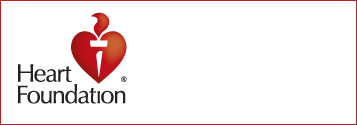High blood pressure
What is high blood pressure?
Blood pressure is the pressure of your blood against the inner walls of your arteries as it is pumped around the body by your heart.
As your heart pumps, the flow of blood in your arteries and your blood pressure rises and falls in a regular wave pattern.
Blood pressure peaks when your heart pumps (called systole) and falls when your heart relaxes (called diastole).
High blood pressure (also known as hypertension) can lead to serious health problems, such as a heart attack, a stroke, heart failure or kidney disease.
How common is high blood pressure?
A Heart Foundation survey completed in 2010 found 1 in 3 Australians aged 30 to 65 had been told by a doctor that they have high blood pressure. This equates to 3.5 million Australians.
Signs and symptoms
There are often no symptoms or signs of high blood pressure – you can have high blood pressure and feel well. Therefore, it is important that you have regular blood pressure checks.
The following factors increase the risks of serious problems associated with high blood pressure:
- smoking
- having high blood cholesterol
- being overweight
- having diabetes.
See the Heart Foundation (external site) for more information on blood pressure.
Diagnosis of high blood pressure
The only way to find out if your blood pressure is high is by having it checked regularly by a health professional.
There is no firm rule about what defines high blood pressure. For most people, the lower the blood pressure the better. However, the following figures are a useful guide.
- Normal blood pressure: generally less than 120/80 mmHg that is, systolic blood pressure less than 120 and diastolic blood pressure less than 80 mmHg).
- Normal to high blood pressure: between 120/80 and 140/90 mmHg.
- High blood pressure: 140/90 mmHg or higher. If your blood pressure is 180/110 mmHg or higher, you have very high blood pressure.
Your doctor is likely to measure your blood pressure several times on several occasions to confirm whether or not you have high blood pressure. He or she may recommend that you do a test to measure your blood pressure over a 24-hour period, or that you measure your own blood pressure at home.
Treatment of high blood pressure
Your lifestyle is very important in helping you to manage high blood pressure and its associated risks. Your doctor will probably advise you to:
- be smoke-free
- reduce your salt intake
- achieve and maintain a healthy body weight
- limit your alcohol intake to no more than 2 drinks per day, or 1 drink per day for women with high blood pressure
- undertake regular physical activity.
Note: some specific types of exercises should be avoided by people with high blood pressure. These include body presses and lifting heavy weights. Ask your health professional for more information.
Many people with high blood pressure will need to take medication for the long-term to help lower it. It is important to take any blood pressure medicine exactly as prescribed. Do not stop taking it or change the dose without talking to your doctor first.
Managing high blood pressure
There are several ways that you can help to manage your blood pressure and reduce your risk of coronary heart disease.
Have your blood pressure checked regularly, as part of an assessment of your overall risk of heart, stroke and blood vessel disease. The higher your risk, the more often that you should have these checks.
- Be smoke-free.
- Limit your alcohol intake.
- Achieve and maintain a healthy body weight.
- Be active every day. Do 30 minutes or more of moderate-intensity physical activity on most, if not all, days of the week.
- Enjoy healthy eating. Choose mainly plant-based foods, such as vegetables, fruits and legumes (dried peas, dried beans and lentils), and grain-based foods (preferably wholegrain), such as bread, pasta, noodles and rice.
- Consume moderate amounts of lean meats, poultry, fish and reduced fat dairy products, and moderate amounts of polyunsaturated or monounsaturated fat.
What about salt?
Eating too much salt is one of the main causes of high blood pressure.
Most of the salt we eat isn’t added at the table; it’s hidden in processed foods we eat every day like bread, breakfast cereals, canned food and pasta sauces.
Choose products low in salt or reduced salt. Shoppers concerned about the amount of salt in foods can look for produce with the Heart Foundation Tick as a healthier choice.
Visit the Heart Foundation Tick (external site) for more information on healthy eating.
Measuring your blood pressure at home and/or at work helps your doctor find out what your blood pressure is outside the clinic, during your usual activities. It will also help your doctor know if any prescribed treatment is working. For more information on self-assessment visit the Heart Foundation (external site).
Where to get help
- Always dial triple zero (000) to call an ambulance in a medical emergency
- See your doctor
- Visit healthdirect (external site) or call 1800 022 222
- Phone the Heart Foundation Helpline on 13 11 12
Remember
- High blood pressure (also known as hypertension) can lead to serious health problems, such as a heart attack, a stroke, heart failure or kidney disease.
- The only way to find out if your blood pressure is high is by having it checked regularly by a health professional.
This information provided by

Acknowledgements
Heart Foundation
This publication is provided for education and information purposes only. It is not a substitute for professional medical care. Information about a therapy, service, product or treatment does not imply endorsement and is not intended to replace advice from your healthcare professional. Readers should note that over time currency and completeness of the information may change. All users should seek advice from a qualified healthcare professional for a diagnosis and answers to their medical questions.